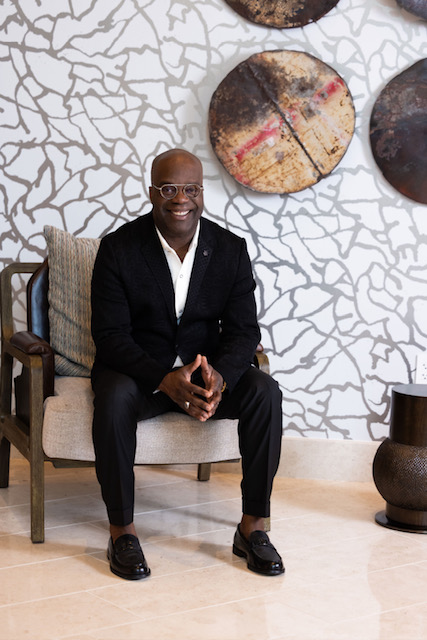Simon T. Bailey’s new book is Resilence @ Work: How to Coach Yourself into a Thriving Future. Like any good nonfiction book falling into the subcategories of business and leadership advice, as well as general self-help to boot, Bailey is able to summarize his core point in a single sentence. Like an MLA paper or thesis statement, conciseness is key, particularly when the focal points are in a decidedly grayer zone than something externally straightforward. Mr. Bailey follows what is a current precept of postmodernist workplace leadership, where one’s personal standing affects professional performance.
URL: https://www.simontbailey.com/
He’s able to provide an upbeat, enthusiastic tonality to the read, while simultaneously fleshing out incredibly multifaceted approaches to maintaining sanity and performance skills in a world where the word ‘arbitrary’, albeit in a contained context, is becoming more and more pertinent to the increasingly shifting, semi-amorphous vista of the current workscape. As Bailey demonstrates, the two are not mutually exclusive. In a world where we are literally more connected than ever, the lines and boundaries between the personal and the professional are changing. A symbiotic rapport when it comes to work and self-determination in the workplace is becoming more pronounced, with people like Bailey being key guides to normalizing things in a manner that’s clear, respectful, and responsible.
“The quality we really need to thrive in our chaotic, fast-paced, competitive, confusing, ever-evolving world is wisdom paired with resilience, or more emphatically, Brilliant Resilience!” Bailey encapsulates, at the beginning of the read. “Wisdom may be the glove, but resilience is the hand that goes into that glove. Resilience is the very application, the embodiment of wisdom. Wisdom is knowing what to do while resilience is actually doing it. According to the Gallup State of the Workplace report, roughly 7 out of 10 people are stressed out, dealing with high anxiety and borderline depression. The workplace imperative now is ‘well-being.’ Resilience decreases stress, reduces burnout, and increases psychological capital. Ultimately, resilient companies increase productivity, passion, and putting purpose before profit, thus becoming even more profitable.”
Keeping with the self-determination of the individual in the workplace, Bailey then expands upon how such an attitude can affect entire company performance as the norm. Workplace organizing following this approach, such as Toyota’s implementation of the Lean system, ensure a sense of stability regardless of the inevitable bumps ahead in long-term performance. Dips in the trend have always proven to be muddied waters to navigate as a business leader. But today, given how competition is also subject to an entire redefinition courtesy of burgeoning technology, it’s a must.
AMAZON: https://www.amazon.com/Resilience-Work-Yourself-Thriving-Future-ebook/dp/B0CQQ2G8K6
A must calibrated to the collective wellbeing of the company’s vision, immediately connected to the collective wellbeing of said company’s employee base from top to bottom. “What Resilience@Work is not is a quick fix, a silver bullet, or a magic pill,” writes Bailey. “It is meant to be a guide to enhance and embellish your life at home, in your community, and at your place of business. It is meant to help you discover the wisdom that is lying dormant in the roiling ocean of your own soul and allow that wisdom to lead to Brilliant Resilience. It is my ardent hope that this book will: invite you to find new waves of possibility as you surf into the future; flip on the light switch so you can see your story inside the main characters’ stories; and examine the details of your work/life journey and not only imagine but also come to realize a brighter, better tomorrow.”
Garth Thomas

